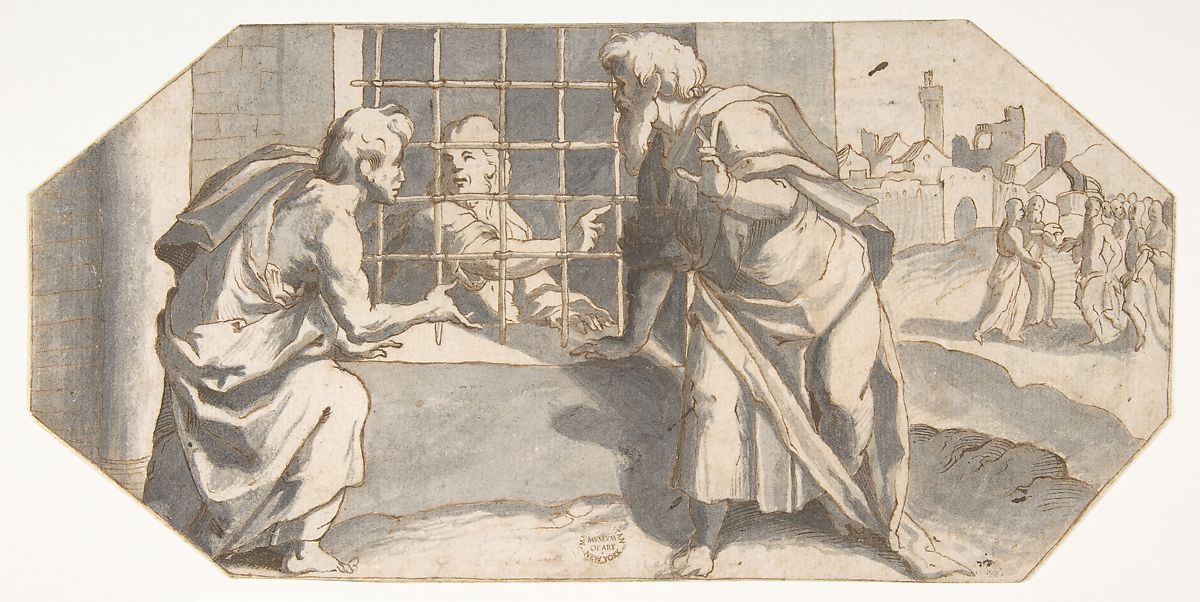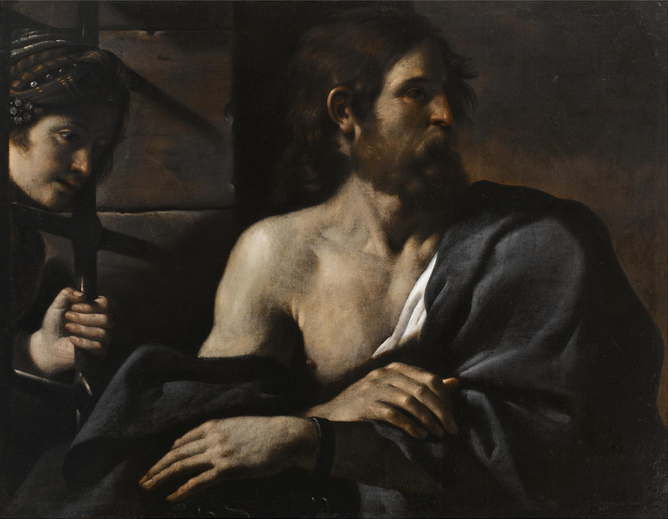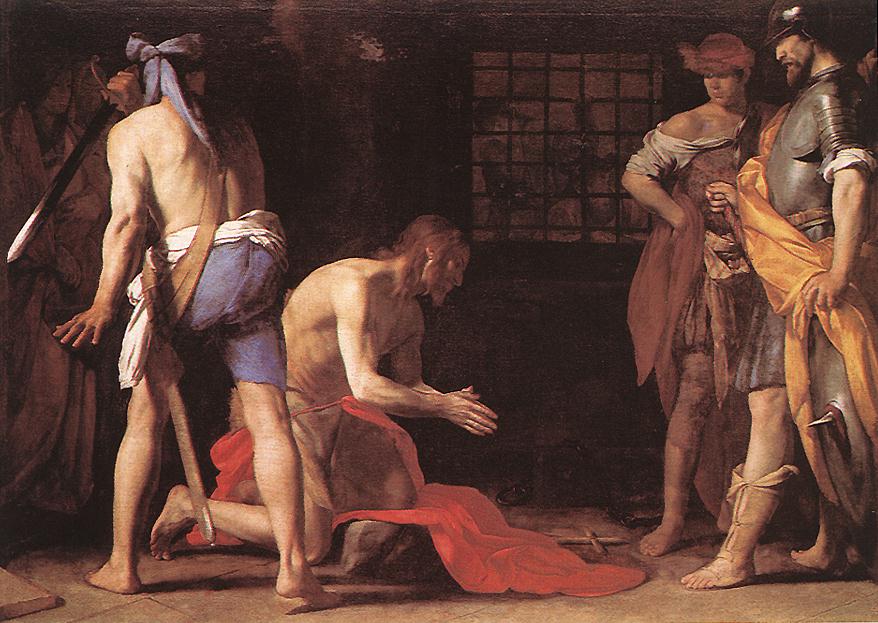Matthew 11:2-10
Pastor James Preus
Trinity Lutheran Church
December 12, 2021
“These are the signs that you shall mark;
The swaddling clothes and manger dark.
There you will find the infant laid
By whom the heav’ns and earth were made.”
So paraphrased Martin Luther the words of the angel to the shepherds in his great Christmas hymn, “From Heaven Above to Earth I Come.” The angel gave the shepherds a sign: a baby wrapped in swaddling clothes, lying in a manger. If the shepherds searched for the Christ in the king’s palace or in the temple in Jerusalem or in any other fine and noble setting, they would not have found the Christ. But since they looked for the signs given to them by the angel, they found Christ Jesus as they had been told, wrapped in linens, lying in a manger.
In our Gospel lesson, John the Baptist is in prison. John had proclaimed Jesus the Lamb of God, who takes away the sin of the world. He proclaimed him as the one who comes after him, who was before him, whose sandals John is unworthy to untie. John’s entire ministry was pointing people to Jesus and proclaiming him the promised Christ. Yet, two of John’s disciples are visiting John in his dungeon. They are doubtful that Jesus truly is the Christ. If Jesus is the Christ, then why does his forerunner languish in prison waiting execution by the godless King Herod? So, John does what he always does. He points them to Christ. He tells his disciples to go and ask Jesus if he is the one to come or if they should wait for another.
“The one to come” refers to the Christ. Christ or Messiah means anointed one. God promised through his prophets that he would send the Christ to set his people free and rule over them in righteousness, justice, and equity. The Christ or Messiah is the one to come. Is Jesus the one to come? Is Jesus truly the Christ, the promised Messiah? That is what John’s disciples have come to ask Jesus.
Jesus does not answer simply yes or no, but rather says, “Go tell John what you hear and see: the blind receive their sight and the lame walk, lepers are cleansed and the deaf hear, and the dead are raised, and the poor have good news preached to them. And blessed is the one who is not offended by me.”
Jesus answered them by pointing to the signs he has done, which prove that he is the Christ. Yet, it is not only that the signs Jesus has done are remarkable. I’ve seen illusionists perform stunts that I could not explain, that have stumped even other illusionists. And certainly, there have been those who have availed themselves of satanic arts. These certainly are not signs that they come from God. The reason these miracles Jesus has performed are signs that he is the Christ, the promised one to come, is because God foretold these miracles by his prophets. Isaiah prophecies in chapter 35, “Then the eyes of the blind shall be opened, and the ears of the deaf unstopped; then shall the lame man leap like a deer, and the tongue of the mute sing for joy.” Again, in chapter 61, he speaks for the coming Christ, “The Spirit of the Lord God is upon me, because the LORD has anointed me to bring good news to the poor.” Isaiah even prophesies that this Christ, who restores sight to the blind and preaches good news to the poor will be a cause of offense. He writes in chapter 8, “And he will become a sanctuary and a stone of offense and a rock of stumbling to both houses of Israel, a trap and a snare to the inhabitants of Jerusalem. And many shall stumble on it.” All the signs point to Jesus as the Christ.
This week of Advent, we deal with doubt. John’s disciples doubted. They aren’t the only ones. You’ve heard of Doubting Thomas. Of course, all of Jesus’ disciples doubted at times. And doubt certainly is a weapon Satan wields against us Christians today. Doubt is the most brazen attack on your faith, which you will encounter. Yet, it clings to your heart like burs on a coat, or better, like tar to cloth. If we are to prepare ourselves for Christ’s second advent, we must overcome the doubt, which arises in our very hearts.
We overcome doubt with the signs, which God has given us in his Holy Word. Yet, this is difficult, because people don’t want to look at the sign’s God gives us, but rather at signs they have invented themselves. People doubt the miracles Jesus performed, especially that he rose from the dead. Why do they doubt this? Hundreds of people witnessed Jesus’ miracles and resurrection. Multiple written sources document and corroborate these events. “Well, because these miracles are impossible.” Who said they’re impossible? Jesus is God. All things are possible with God. “Well, because Jesus can’t be God. No one can know God. God might not even exist.” So, you see, these signs of Jesus’ are only in doubt, if you accept the arbitrary criteria of biased skeptics, who themselves cannot prove their own presuppositions. Their anti-supernatural bias causes them to deny events reported by multiple eye witnesses, while they espouse “scientific” theories, which are unprovable and far-fetched at best.
The signs that will overcome your doubt are given to you by God in his Holy Word. But people do not want to look at God’s Word. They want to make up their minds with their own shallow judgments. I once met a young man, who left the Lutheran Church and became a Pentecostal. I asked him why. He said, “Because he became convinced by their fruits of the Spirit.” He meant speaking in tongues and miraculous healings, which he had witnessed. Now, we could critique these so-called speaking in tongues and healings, and point out that there is no actual proof that they are speaking any real language, and much proof that these noises they make are just made up (subconsciously or not). And the supposed healings are usually proven to be fake as well. Yet, we don’t even need to disprove the speaking in tongues and healings to prove that you shouldn’t leave the Lutheran Church, where the Gospel is proclaimed to join a church that rejects God’s work in Baptism, the Lord’s Supper, and the creation of faith. You simply need to look at Holy Scripture and the signs, which Christ promises will mark his Church.
Where does Jesus promise that his Church is where there will be speaking of tongues and healings? He does promise that these signs will accompany the apostles, but he never promises that these signs will endure to all ages (Mark 16:17-8). In fact, St. Paul explicitly tells us that speaking in tongues will stop, as they have since the apostles died (1 Corinthians 13:8). The signs that point to Christ are not necessarily the things that cause you to marvel. The signs that point to Christ are the signs that Christ has given us, so that we know him. These signs are called the Marks of the Church.
The Marks of the Church are the signs that Christ promises to be with his Church, so that you can identify him in this world. These marks are Baptism, the Lord’s Supper, Absolution, and the preaching of the Gospel. One of the greatest tragedies among Christians is when a tormented soul becomes convinced that he needs to be re-baptized. Such a person usually thinks it takes much faith to be re-baptized, but it is quite the opposite. To be baptized again is to doubt the promise God made in your first and only true Baptism. Scripture says there is one Baptism (Ephesians 4:5). Scripture says that Baptism gives the Holy Spirit (Acts 2:38). Jesus says that whoever believes and is baptized will be saved (Mark 16:16). St. Paul promises that whoever has been baptized into Christ has put on Christ (Galatians 3:27). To be rebaptized means to doubt God’s promise, which he attached to Baptism and to trust in yourself to do what only God can do: create faith and forgive sins. But when you look to Baptism as God has given it to you, you see an endless stream of grace and forgiveness. When you sin, when doubt assails you, when death frightens you, look to your Baptism and the promise of forgiveness, restoration, adoption, and eternal life God has attached to it, and your doubt flees.
Many are offended at the teaching that the Lord’s Supper is Christ’s true body and blood. Lutherans have been called cannibals for teaching this. Many protestants have called us slaves to the Papacy, as if the teachings of the Roman Catholic Church convinced us that the Sacrament is Christ’s body and blood and not the clear words of Jesus, which says, “This is my body; This is my blood.” But the Sacrament of the Altar is a mark of Jesus’ Church, because Jesus said it is. “Do this in remembrance of me.”, Jesus commands us. In this meal Jesus promises forgiveness in his blood, which is the greatest sign of Christ.
The most offensive mark of the Church was the last sign Jesus mentioned to John’s disciples, “and the poor have good news preached to them.” The proclamation of the Gospel is a sign of offense to many, yet it is also the most comforting and reassuring mark of the Church.
The proclamation of the Gospel is offensive, because it denies your pride. Whoever exalts himself will be humbled, but whoever humbles himself will be exalted. That is the message of the Gospel. The Gospel leaves John the Baptist in prison, soon to have his head cut off, while insisting that it liberates the captives. That is because the Gospel deals with the kingdom of heaven and eternal life, not the transitory glory of this world. The Gospel denies your ability to save yourself or exalt yourself above others. Your list of good works will not win your salvation. Rather, the Gospel offers free salvation to those who did not work for it, to those who offend you by their weakness. The Gospel gives free salvation to those who do not deserve it by the merits of Christ Jesus. The Gospel proclaims Christ crucified, a hero who forsakes all earthly glory and instead suffers a miserable and embarrassing death. This is why the Gospel is offensive.
Yet, the Gospel is the only sign that can dispel all doubt. Baptism, Absolution, the Lord’s Supper, these are all vessels of the Gospel message. They relay the Gospel and they cannot abide without the preaching of the Gospel. The Gospel dispels doubt, because it proclaims God’s promise of forgiveness and acceptance for Christ’s sake. Do you doubt whether God loves you? Look at the cross! See where God’s Son hangs! And know that he did that willingly for you. Before God sent Christ Jesus to become man and die for your sins, he already knew every sin you would commit. Before Jesus took on the sins of the whole world and carried them to the cross, he knew all your sins, even the most grievous and embarrassing. And he intentionally went to the cross to forgive them with his blood. Why would God send his Son to die for your sins, if he did not intend to forgive all your sins? Why would Jesus willingly suffer for you if he did not intend to save you?
The Gospel message leaves no room for doubt. The Gospel message demands to be believed, because it is clearly true. Christ Jesus did die for the sins of the world. He is risen from the dead. And he has clearly stated that he has done this to save sinners. And the Gospel message has power to be believed. The promise of your Baptism insists on the Gospel message. The Absolution and Supper reinforce the Gospel truth. These are the signs that you should mark to find Jesus and know what he has done for you. These are the signs that turn doubt into faith. Amen.




 RSS Feed
RSS Feed